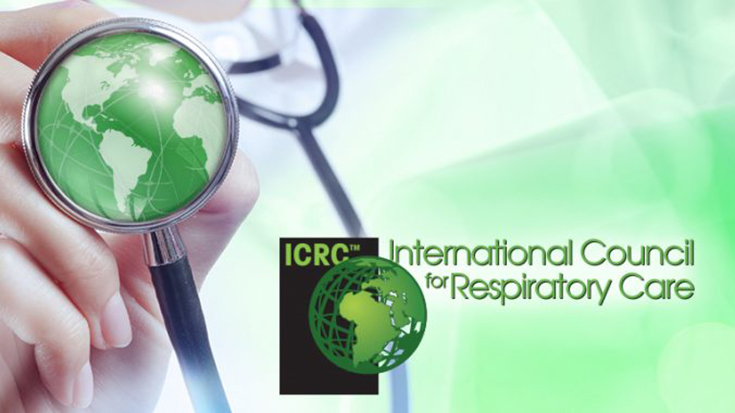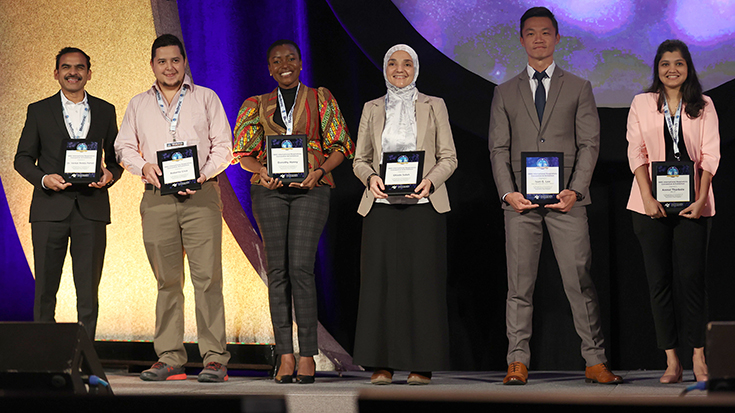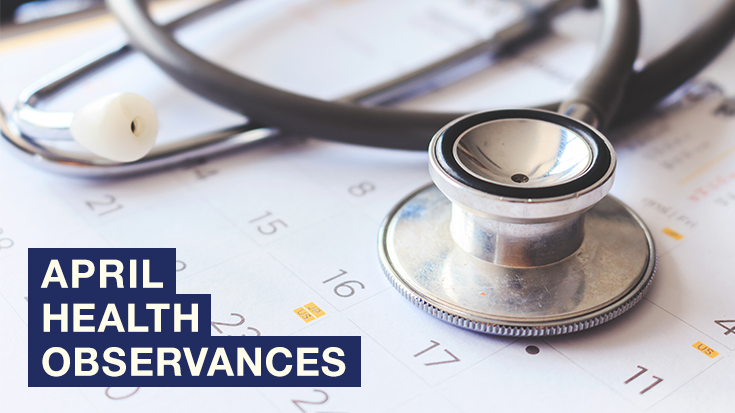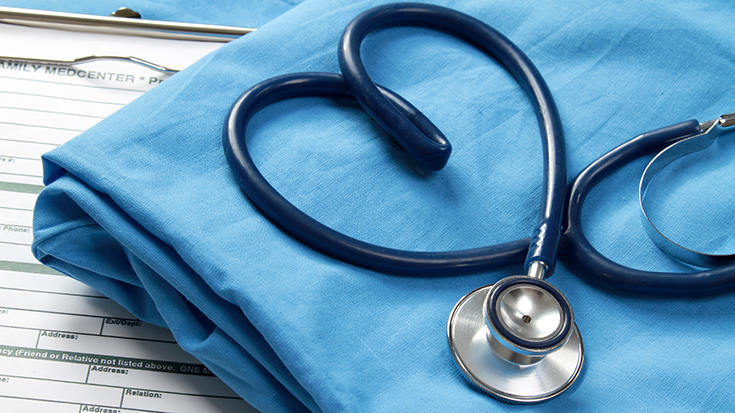
On the morning of March 4, 2022, a team of Physicians, Nurses, Physical Therapists, and Respiratory Therapists from Nemours Hospital for Children set out on the trip of a lifetime. The team from Wilmington, Delaware, left the crisp 29-degree winter air for an 18-hour voyage to the sizzling temperatures in the country of Nigeria.
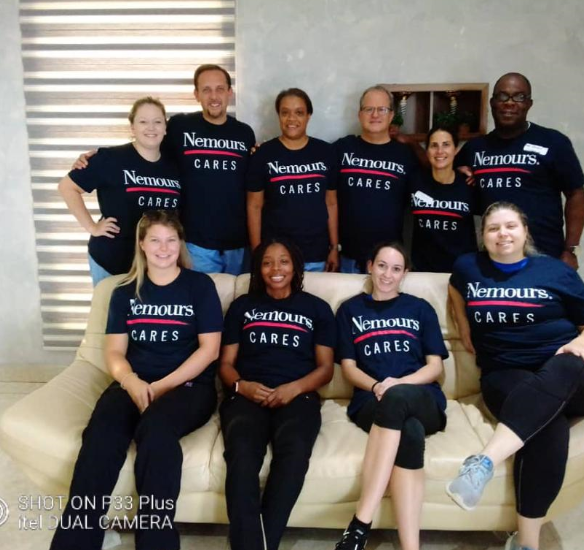 Kelly Massa top left, Rustin Bladen, second from top left, Dr. Nwankwor pictured top right.
Kelly Massa top left, Rustin Bladen, second from top left, Dr. Nwankwor pictured top right. This trip was the second time a team from Nemours has traveled to Nigeria. Their last visit was in 2019. Both trips were led by Pediatric Intensivist Odiraa Nwankwor and included Respiratory Therapists. Their goal was to share knowledge with fellow Nigerian medical professionals at the University of Nigeria Teaching Hospital (UNTH) in Enugu, Nigeria.
Dr. Nwankwor attended medical school in Nigeria, most of his time at UNTH. So he knew firsthand the needs of the people of Nigeria, so he decided to build their first pediatric intensive care unit (PICU).
Developing a PICU with limited resources takes quite a team. To learn about this experince, I talked with Dr. Nwankwor and the three RTs who have traveled with him over the years to help build this PICU from the bottom up. It was nothing short of amazing.
In 2019 Rustin Bladen and Kelly Massa joined the group on their maiden voyage. This past year in March, Rustin went again along with fellow RT Kimmy Garrant.
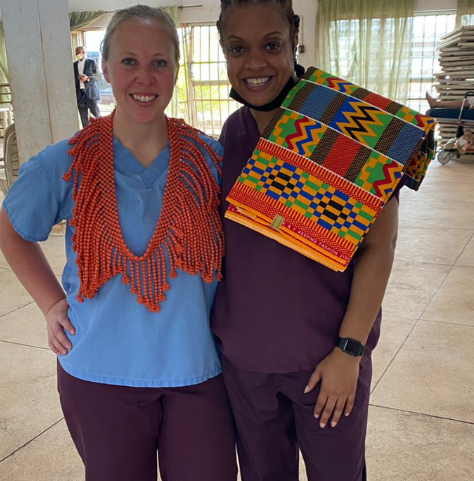 Kimmy Garrant and Rustin Bladen.
Kimmy Garrant and Rustin Bladen.During the first trip in 2019, the RTs played a significant role in the design of the ICU. For example, Rustin and Kelly recommended placements for gas adapters and the setups of donated ventilators in the unit. In addition to the structural setup process, the RTs delivered lectures, provided skill station training, and participated in bedside care during both trips.
A Respiratory Therapist in Nigeria is called a Physiotherapist. These medical professionals wear many hats; they provide respiratory care and physical and occupational therapy. As you can imagine, they have a lot of responsibilities when it comes to patient care.
“We are so incredibly fortunate to have an abundance of resources readily available,” Kimmy said. “When we are out of a piece of equipment, we have a list of rental companies to call upon for a quick delivery.” However, with the new equipment comes the need for education to manage these new resources. This need for education is where RTs make a notable difference on these mission trips.
Kelly and Kimmy recall teaching BLS and PALS and demonstrating the importance of practicing working in an interdisciplinary team. Because the Nigerian hospitals do not maintain training as we do in the states, hands-on sessions like these allowed them to sharpen their skills and work on communication. Rustin mentioned that soon after a BLS training session, a child went into cardiac arrest, and the staff performed CPR and obtained ROSC, putting their newly learned skills to the test. This act was a massive victory for the team.
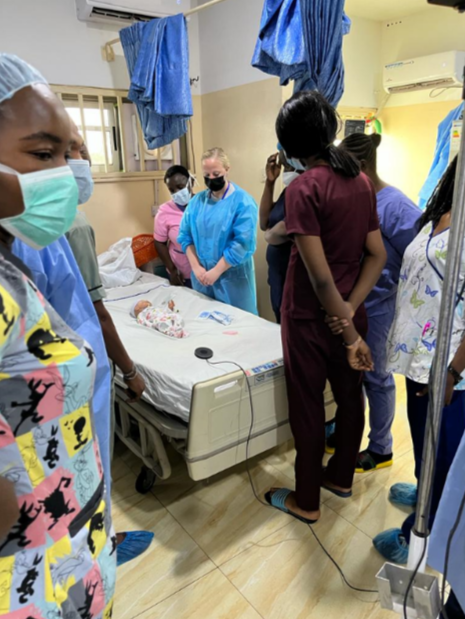 Kimmy assisting in a mega code scenario.
Kimmy assisting in a mega code scenario.Rustin, Kelly, and Kimmy all have amazing stories of what was particularly eye-opening for them, but Kimmy’s story truly stood out.
“Due to the underdeveloped social and economic structures, health care is typically a ‘Pay as you go’ type of industry. Meaning, if you don’t pay for it, your child doesn’t get it. This goes for labs, radiology, increasing support, etc. We rounded in the NICU one morning and saw a baby on a bubble CPAP from a large H cylinder oxygen tank. We noticed that the tank was reading ‘EMPTY.’ When we brought it to the attention of the attending on that morning, she casually stated, ‘Mom hasn’t purchased a new tank yet’ and proceeded with rounds. A few minutes later, mom showed up at the bedside and showed her receipt of purchase for a new tank. Moments later, a maintenance man brought in a new tank and set it up. We are so used to piped-in gas lines, and this hospital is running tank by tank.”
Rustin tells of a patient that came in hypoxic and struggling to breathe. This patient was trach and vented, not common for the area. With an uncuffed trach tube, the patient got a chest x-ray from a machine donated by Nemours. Rustin quickly noticed that one lung was completely whited out and suggested a cuffed trach the team had brought with their supplies. They changed the trach out per Rustin’s recommendation, and the child improved over a few days.
Stories like these are ones we take for granted. However, Dr. Nwankwor knows that critical care delivery is a multidisciplinary task and that trips like these are not complete without the skills of a Respiratory Therapist. This trip, Kelly said, “was humbling and reignited the passion to help others in everyone that went.”
Although Dr. Nwankwor spends most of his days now caring for the children of Nemours, a piece of his heart will always remain with the people and children of Nigeria. After talking to Rustin, Kelly, and Kimmy, I know Nigeria will always hold a piece of their hearts.
Email newsroom@aarc.org with questions or comments, we’d love to hear from you.








